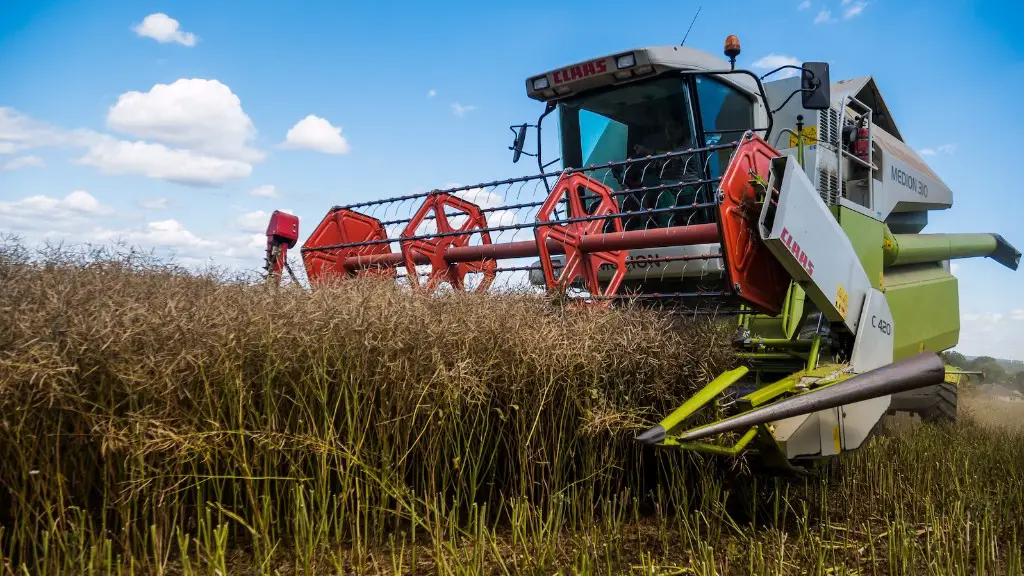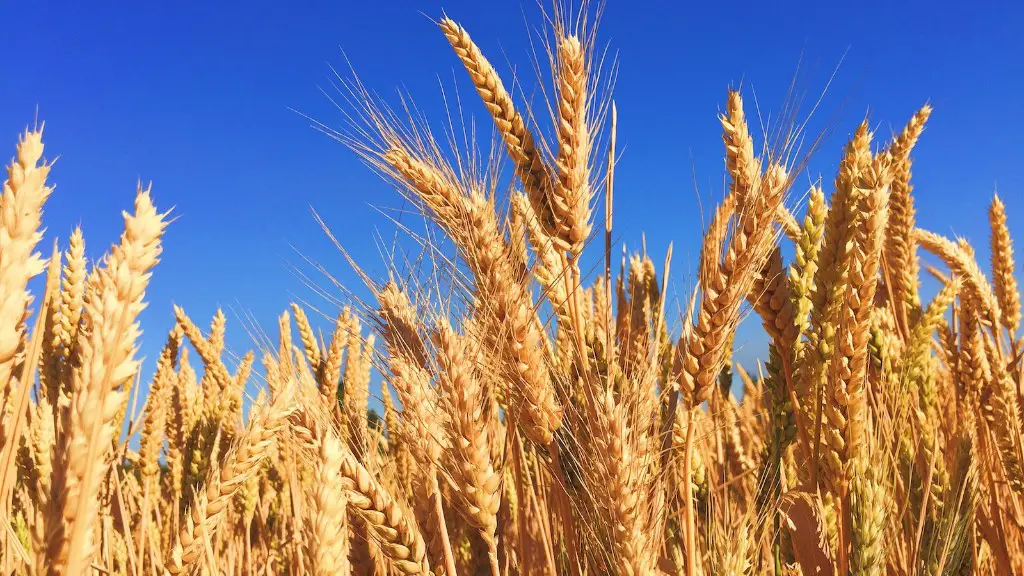Agriculture has long been a cornerstone of human societies, and its role in producing necessary food for human consumption is well established. Yet, the positive effects of agriculture extend far beyond merely providing sustenance. In this article, we’ll discuss the extensive and varied benefits of agriculture for humankind.
Agriculture provides economic diversification and promotes financial stability. It can help developing countries to reduce poverty levels and integrate more effectively into global markets, allowing them to benefit from international trade. Agriculture also encourages investment in infrastructure such as roads and irrigation systems, which can then help to bring wider economic improvements.
Agriculture can have positive impacts on the environment. By restoring degraded land such as former mine sites, it can bring improvements to wildlife and habitats, increase biodiversity, and reduce the occurrence of water pollution. Furthermore, agricultural practices can help reduce climate change by directly removing carbon dioxide from the atmosphere.
Agricultural practices are making an immense contribution to human health and wellbeing. By providing access to a nutritious and balanced diet, agriculture can help improve overall public health. Meanwhile, sustainable farming methods reduce exposure to harmful chemicals, thus improving the health of those living in rural areas.
Agriculture contributes to global food security, helping to ensure that more people have enough to eat. Improved agricultural practices and technologies are helping farmers to increase yields, while also reducing wastage and improving nutritional value. This not only helps to reduce hunger on a global level, but can also provide a vital lifeline for some of the world’s most vulnerable populations.
Agriculture can also have positive social impacts. It provides an important source of employment for many people, particularly in the rural sector, and this can therefore help to reduce unemployment and stimulate economic and social development. Moreover, the stabilizing income from agriculture can help to create stable communities and promote social cohesion.
Finally, agriculture plays an important role in culture and belief systems. For many rural communities, the relationship between the land, culture, and spiritual well-being is deeply embedded. Thus, healthy and sustainable farming practices contribute to preserving cultural and religious traditions in many parts of the world.
Economic Benefits of Agriculture
Agriculture provides economic stability and diversification in many parts of the world. It helps developing countries to reduce poverty levels and integrate more effectively into international markets. This improved access to global markets can then lead to increased exports, creating a positive impact across the economy. Increased agricultural exports can in turn create more jobs and opportunities for economic growth. Furthermore, agriculture encourages investment in infrastructure, such as roads and irrigation systems, to create more efficient and productive systems.
Such investments can result in improved productivity and increased yields, leading to greater food supply and improved nutrition. With increased financial resources from exports, countries can focus on developing institutions to improve economic diversification and promote financial stability. This can enhance the economic performance of countries and reduce reliance on international aid. Furthermore, improved access to financial resources can spur innovation and stimulate sustainable economic growth.
Agriculture also provides access to credit, helping to move people out of poverty and facilitate their participation in financial activities. It can even help create employment opportunities in rural areas, which can help to tackle unemployment and stimulate economic activity. Moreover, increased agricultural activity can reduce unemployment rates in the entire economy.
Agriculture provides a variety of economic benefits, from improved access to global markets and increased employment opportunities to increased financial stability and reduced reliance on international aid. It also encourages investment in infrastructure and provides access to credit, helping to facilitate poverty alleviation and a range of financial activities.
Environmental Benefits of Agriculture
Agriculture can have a positive impact on the environment. Sustainable farming practices can help to reduce pollution from chemical fertilizers and pesticides and restore natural resources such as soil fertility, water resources, and wildlife habitats. This can help to protect land from degradation, reduce greenhouse gas emissions, and promote biodiversity.
Agriculture can also help to preserve threatened ecosystems by providing more food production in a way that is less intensive than traditional techniques. Sustainable farming techniques encourage better land management, reducing soil erosion and protecting water sources. By minimizing land tillage, reduced nutrient runoff and improved water infiltration can help reduce water pollution and water contamination.
Agricultural practices can even help to combat climate change by sequestering carbon dioxide from the atmosphere and storing it in soil and plant tissue. This can reduce the amount of carbon dioxide in the atmosphere and help to decrease the effects of global warming. Meanwhile, biodiversity is enhanced as sustainable farm practices help to preserve and protect ecosystems, preserving and protecting some of the world’s most endangered species.
By preserving unwanted agricultural land and restoring degraded land, agriculture can help conserve and protect natural habitats and wildlife. Such estimates suggest that proper management of agricultural lands could play an important role in reducing the environmental impacts of farming. Moreover, increased agricultural yields can help to reduce agricultural waste, leading to a reinforced and more sustainable environment.
Agriculture can provide many environmental benefits, from improved water infiltration and reduced nutrient runoff to carbon sequestration and improved biodiversity. Sustainable farming practices can help to reduce agricultural waste and protect soil health, while also preserving natural habitats and helping to protect endangered species.
Positive Impact on Human Health and Well-Being
Agricultural practices are making an immense contribution to human health and wellbeing. By providing access to a nutritious and balanced diet, agriculture can help to reduce malnutrition and improve overall health. Improved agricultural techniques and better management of crops can help reduce the incidence of diseases such as malaria and trachoma, two of the world’s most deadly epidemic diseases.
Sustainable farming practices can reduce the exposure to harmful chemicals and create healthier environments for those living in rural areas. This can help to reduce acute and chronic illnesses, potentially saving lives and reducing healthcare costs. Furthermore, agricultural practices can improve air and water quality, reducing pollutants and increasing access to cleaner water.
Improved access to food can not only improve nutrition, but can also help to prevent starvation in many countries. Improved agricultural yields and storage technologies can allow for a wider variety and greater availability of food. This can help to mitigate famine, particularly in developing countries. Moreover, improved access to food can help to reduce food insecurity, which can lead to a decrease in stress and better mental health.
Agriculture can even help to promote social inclusion, improve gender equality, and reduce poverty. Improved access to food can help to reduce disparities between genders and allow for more equitable access to resources. Furthermore, increased agricultural activity can stimulate economic growth, providing more opportunities for job creation and income generation.
Ultimately, agriculture can play an important role in promoting both physical and mental health. Improved access to food can help to reduce malnutrition and famine, while sustainable farming practices can reduce the prevalence of diseases. Meanwhile, increased access to income and employment opportunities can help to promote social inclusion and reduce disparities between genders.
Impact on Food Security
Agriculture plays an essential role in global food security. It contributes to adequate and nutritious food supplies for people around the world. Improved agricultural techniques and the use of advanced farming technologies can help to increase yields, reduce waste and improve nutritional value of food.
For many communities, increased food security can lead to improved health and wellbeing. It can reduce the risk of malnutrition, improve dietary diversity and provide access to a balanced diet. Moreover, improved access to food can also help to reduce poverty and bring relief to some of the world’s most vulnerable populations.
Agricultural productivity can even mitigate the effects of natural disasters, such as drought and flood, by providing a source of consistent food supplies. Furthermore, improved agricultural practices and better access to markets can help to increase agricultural exports, providing a wider range of food choices and improved access to a nutritious diet.
By helping to reduce hunger and malnutrition, agriculture can contribute to improved health and nutrition in many parts of the world. Improved agricultural practices can help reduce food waste and increase food production, helping to reduce the likelihood of starvation and malnutrition. At the same time, increased agricultural productivity can provide access to a wider range of food choices and improved food security.
Impact on Social Development
Agriculture can have positive impacts on social development. It provides an important source of employment in many parts of the world, particularly in the rural sector, leading to increased economic activity and improvements in quality of life. Moreover, increased agricultural activity can create jobs and provide access to financial resources, helping countries to reduce unemployment and stimulate economic and social development.
The stabilizing income from agriculture can also help to create stable communities and foster social cohesion. By providing access to financial resources, agricultural activity can facilitate poverty alleviation and bring social welfare to rural areas. This can help to promote gender equality and reduce disparities between genders, allowing for more equitable access to resources.
In addition, agricultural activity can help preserve cultural and religious traditions in many parts of the world. Agricultural rites and rituals have long been a part of many cultures, and are an important part of their belief systems. By preserving these traditions, agriculture can help to promote cultural identity and contribute to the social and cultural wellbeing of rural communities.
Ultimately, agriculture can have positive impacts on social development. It provides access to jobs and financial resources, helping to reduce poverty and improve quality of life. Furthermore, it can help to preserve cultural and religious traditions, promoting cultural identity and contributing to social and cultural wellbeing.





